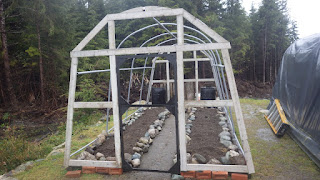Magnificent May Day the Worker's Holiday
In addition to being a world-wide important spiritual holiday, Beltane or May Day is also the Worker's Holiday. This year, May Day fell on a Sunday so we were able to hang up our farm work gloves to dry for a moment.
Back in early April, we were already busy preparing the garden beds by laying down black plastic to heat up the soil and kill off the weeds. We found out about this "occultation" method from Jean-Martin Fortier at The Market Gardener in Quebec, who discovered this method purely by chance and coined the word himself.
Speaking of market gardening, we sold our first batch of kale at the Sointula Resource Centre's garden stand. We have since sold more kale, walking onions, lovage, and sorrel. Herbal bouquets are coming soon.
To house these heat-loving plants, we are converting one of our Shelter Logic storage tents into a greenhouse. We have screwed 1"x4" boards into the ends which will be covered with greenhouse poly. The arches will be covered with a woven transparent fabric and secured with some used fish netting against the wind.
The Rainier cherry tree always seems to have the first blossoms!
This is the second year since we planted the asparagus, so we will be able to eat some later in the spring. All the 50 plants are up, so next year we should have some to sell.
The strawberries are also blossoming, so there should be some tasty June berries too.The warmer weather and sunshine has brought the herb bed alive, including sage, oregano, sorrel, chives, lovage, dandelion, and thyme. A wild flower mixture for the bees has been seeded in the back that is covered with remay cloth so that the birds don't eat the seeds before they sprout.
The garlic is growing fast -- there are 100 hard neck and 20 soft neck that can be braided.
The kale just loves the cool weather and we will have lots to sell. Why buy the Mexican stuff in the store when ours is hyper-local and super-organic?
Last year's raspberry shoots are coming alive. We will transplant the new shoots down in the orchard in the fall.
Now that we have shown you all the stuff that's growing, here is a special cooking and eating feature. Here is a salad bowl with all our own greens including kale leaves and flowers, cabbage leaves, sorrel, lovage, walking onions, sage, oregano, and chives. Only the apple chunks and pumpkin seeds are not from our garden.
Here are some tasty overwintering leeks that are great in soups and salads.
This is one of our weekly sourdough power pizzas. Not much local here but we use homemade spelt sourdough crust topped with homegrown basil pesto, Greek kalamata olives, pineapple chunks, Mexican red sweet peppers, feta cheese, dry pepperoni, organic BC mushrooms, and finally covered with Daiya vegan fake mozzarella cheese. Loaded, loaded, loaded! This is baked on top of a pizza stone using parchment paper to make things easier for 20 minutes at 450 degrees F. We always make two pizzas so there is plenty for a couple of days.
This is our novel bread-making method. Using the Nutrimill (as pictured in the bottom right below), we grind Hard Red Wheat kernels from Anita's Organic Mill in Chilliwack that we order in 50 pound bags through our local Sointula Co-op. We grind about 20 cups of wheat kernels at a time. This way the flour is fresh and none of endo-sperm has been removed like in store bought flour. We knead the dough in five bread-makers using the "Dough" setting. We bought these machines at various thrift stores for $2 to $5 apiece that people had dumped once novelty wore off. We just love living off the waste of consumer capitalism.
Here is the recipe from our first bread-making book. We made a couple of adjustments by substituting apple or plum pulp for butter and oil. We canned all the leftover pulp from our juice-making specifically for this purpose.
Here is the cover of our first bread-maker that we bought for $8 at a Vancouver thrift shop 14 years ago. This was a fancy double paddle machine and we started making bread directly in it. After a few months of baking in the machine, the paddles seized up and couldn't be fixed. So rather than throw out this amazing machine, I found Breadmakerparts Guru on the internet who said he could send us a new pan for $50US. It turned out to be a total scam, but I realized used bread-makers were a dime a dozen for a couple of bucks at many thrift stores. Just don't use them for actually baking the bread as the paddles will soon seize up. Instead, just use the "Dough" setting to knead the dough and then put it in baking pans into the oven.
There is also another twist to the bread-making method. We soak the
dough overnight with a couple of tablespoons of apple cider vinegar and water to break down the cell walls of the wheat kernel to make it easier to digest.
Here is Fuzzy the Cat guarding the seed potatoes before they are planted.




























Awesome scene you guys have. Look forward to seeing it in person.
ReplyDelete